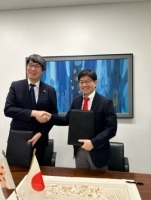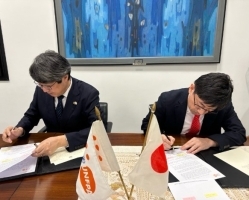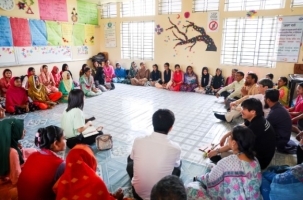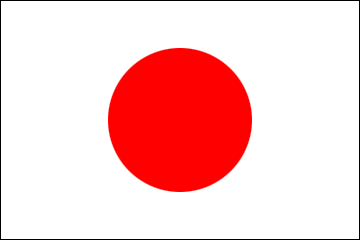What's New
2024/10/22
UNFPA and Japan sign $3.3 million assistance to Protect Rohingya Refugee and Host Community Women and girls in Cox's Bazar and Noakhali Districts.



Dhaka, 22 October 2024 – The United Nations Population Fund (UNFPA) and the Government of Japan have today announced a groundbreaking partnership to empower Rohingya Refugee women and girls as well as the surrounding host communities in Bangladesh.
The Rohingya Refugee humanitarian crisis has been a protracted protection crisis lasting over seven years, significantly impacting the lives, security and well-being of both Rohingya Refugees and host communities. The Government of Japan has committed $3.3 million USD (JPY 500 million) to support UNFPA’s efforts to strengthen Sexual and Reproductive Health (SRH), Gender Based Violence (GBV) prevention and response services for women and girls, including child marriage prevention and engagement with adolescents and youths for transformative changes in SRH and GBV outcomes in the climate change affected districts of Cox’s Bazar and Noakhali.
The project, which is titled “Advancing the Women, Peace and Security Agenda for Displaced Persons from Myanmar and Host Communities in Cox's Bazar and Noakhali Districts,” consists of three main components, each addressing the most essential needs of Rohingya women and adolescent girls in Cox’s Bazar and Bhasan Char, as well as the affected host communities in Noakhali and Cox’s Bazar districts in Bangladesh.
The project’s primary focus is on addressing sexual and reproductive health (SRH) needs, aiming to create a demand for services while building the capacities for sustainable and robust health services. The second component addresses GBV against women and girls - and focuses on facilitating access to life-saving protection services through Women Friendly Spaces (WFS) and Women-Led Community Centers (WLCC), as well as Women Affairs Offices and Women Help Desks in Police stations. The third component specifically targets adolescents and youth (A&Y) vulnerable to child marriage, adolescent pregnancy and exclusion from humanitarian aid. The project prioritises their right to comprehensive health and life skills education in formal and non-formal school environments. This empowers marginalised Rohingya and Bangladeshi girls and boys to safeguard their human security as they transition from adolescence into adulthood.
During the signing ceremony at the Embassy of Japan in Dhaka, H.E. Mr. Iwama Kiminori, Ambassador of Japan to Bangladesh, said “I was impressed by observing the previous UNFPA project site this year. I am delighted that Japan can provide additional assistance to Cox’s Bazar and Noakhali districts, and to the host communities through UNFPA. While many women and girls are suffering from reproductive and maternal health problems and GBV due to the protracted Rohingya crisis, assistance to those areas has been relatively scarce. I hope that this assistance will contribute to the protection of women and girls, their dignity, and improvement of their quality of life.”
“With the generous support of Japan, UNFPA is able to work with the Government of Bangladesh to scale up lifesaving SRH, and GBV services and strengthen linkages between key health facilities in Cox’s Bazar and Noakhali districts.” said Masaki Watabe, Representative a.i. of UNFPA Bangladesh during the signing ceremony. He continued “UNFPA works to achieve human security through health, protection and empowerment. We thank the Government of Japan for the confidence expressed and most notably their encouraging engagement to improve reproductive health and protection outcomes for women and girls and across Noakhali district and in upazilas like Ukiya and Teknaf in Cox’s Bazar.”
Since the beginning of the emergency in August 2017, Japan has been a steady supporter of the Rohingya Refugee response in Bangladesh, contributing over USD $220 million to UN agencies as well as NGOs in Bangladesh, including through this new funding.
Background Information
Rohingya Refugee Camps in Bangladesh.(1)
Approximately 1 million Rohingya refugees are living in refugee camps in Cox’s Bazar, Bangladesh. The Rohingya are a Muslim ethnic minority group who have lived for centuries in predominantly Buddhist Myanmar - formerly known as Burma. Despite living in Myanmar for many generations, the Rohingya are not recognized as an official ethnic group and have been denied citizenship since 1982, making them the world’s largest stateless population.
Rohingya families are denied basic rights and protection and are extremely vulnerable to exploitation, gender-based violence (GBV), and abuse. The Rohingya have suffered decades of violence, discrimination, and persecution in Myanmar. Their largest exodus began in August 2017 after a massive wave of violence broke out in Myanmar’s Rakhine State, forcing more than 742,000 people - half of them children - to seek refuge in Bangladesh. Entire villages were burned to the ground, thousands of families were killed or separated and massive human rights violations were reported. These refugees in Bangladesh remain overwhelmingly reliant on humanitarian aid, with 96% of their basic needs being provided through such assistance.
UNFPA
United Nations Population Fund (UNFPA) is the UN’s sexual and reproductive health agency. Our mission is to deliver a world where every pregnancy is wanted, every childbirth is safe and every young person's potential is fulfilled. We promote gender equality and empower women, girls, and young people to take control of their bodies and their futures. We work with partners in more than 150 countries to provide access to a wide range of sexual and reproductive health services. Our goal is to end unmet needs for family planning, preventable maternal death, and gender-based violence and harmful practices including child marriage and female genital mutilation by 2030.
